UK Sanctions Iran’s Hijab Police For Violence Against Women
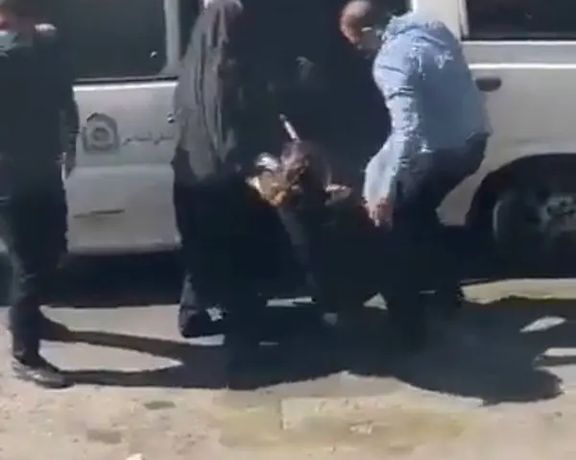
Britain has sanctioned Iran's so-called “morality” or hijab police, over its threats of detention and violence to control what Iranian women wear and how they behave in public.

Britain has sanctioned Iran's so-called “morality” or hijab police, over its threats of detention and violence to control what Iranian women wear and how they behave in public.
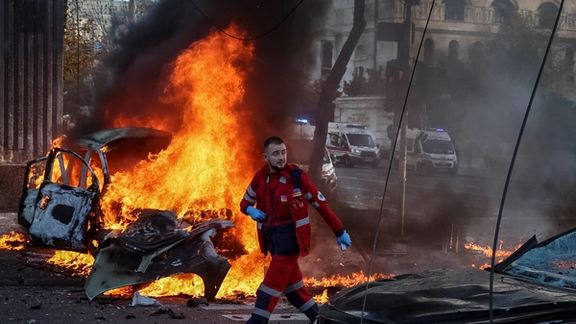
President Volodymyr Zelensky said Monday Russia had used Iran-made drones responding to Saturday’s attack on the Kerch bridge linking Crimea with the mainland.
After explosions in several Ukrainian cities Monday morning, ending months of calm in Kyiv and reportedly killing at least eight in the capital, Zelensky gave a video address on social media. “This morning is difficult,” he said. “We are dealing with terrorists. Dozens of missiles and Iranian Shaheds. They have two targets: energy facilities throughout the country…[and] people. There may be temporary power outages now, but there will never be an interruption in our confidence – our confidence in victory.”
Russian President Vladimir Putin said Sunday the truck-bombing of the Kerch bridge, Europe’s longest and linking Russian-held Crimea to the mainland, was “a terrorist act” organized by Ukrainian intelligence agents and “aimed at destroying critical Russian civilian infrastructure.”
Zelensky’s claims over Iranian drones were the latest from Ukrainian leaders. Last week Oleksiy Kuleba, head of the Kyiv military administration, said six explosions 75km south of Kyiv in a military base at Bila Tserkva were caused by Iranian-made Shahed-136 delta-wing ‘kamikaze’ drones.
‘Cheap alternative’
Ukrainian officials had earlier suggested the drones offer Moscow an easily-assembled, cheap alternative to high-precision missiles or piloted air raids, although Nataliya Gumenyuk, a spokeswoman for the Ukrainian military command, recently told AFP news agency the Shahed-136’s effectiveness was “very low”. In the Bila Tserkva attack, six drones were shot down, while another six crashed into buildings, injuring one soldier.
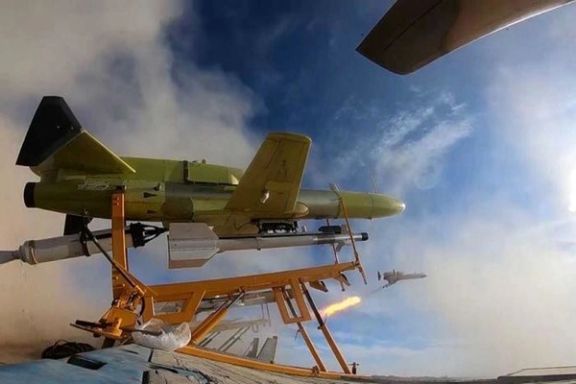
Tehran has denied supplying drones to Russia. Iran foreign ministry spokesman Nasser Kanaani last week said media reports were “baseless.” US National Security Advisor Jake Sullivan claimed July Iran had agreed to supply drones to Russia, a warning repeated by officials several times. In September, the US imposed sanctions on several companies for helping or facilitating the drone transfers to Russia.
Ukraine is also lobbying for increased supplies of US weapons. Politico reported Monday that discussions on air-defense batteries would “loom large at the US-led Ukraine Defense Contact Group… in Brussels later this week.” Ukraine’s Defense Minister Oleksii Reznikov said “the best response to Russian missile terror is the supply of anti-aircraft and anti-missile systems to Ukraine” so as to “protect the future of Europe.”
Ukraine seeks Israeli arms as rhetoric escalates
Ukraine is also keen to source arms from Israel, a top-ten global weapons exporter and the Middle East’s main drone producer alongside Turkey. While Ankara has supplied Ukraine since 2019 with the advanced Bayraktar TB-2drone, Israel has been reluctant to arm Ukraine due to its generally good relations with Russia, a situation Zelensky claimed in September had left him “in shock.” With parliamentary elections due November 8, Israeli politicians are also wary of alienating the Russian-speakers m around 15 percent of voters.
In a further sign of possible escalation in the ten-month Russia-Ukraine conflict, Belarusian President Alexander Lukashenko said Monday he had ordered troop deployment alongside Russian forces near Ukraine in response to what he said were planned Ukrainian “strikes” on the territory of Belarus. The Ukrainian military claimed Saturday Russia had deployed Iranian drones in Belarus.
“Tell the president of Ukraine and the other lunatics: if they touch one meter of our territory then the Crimean Bridge will seem to them like a walk in the park,” Lukashenko said.
Justifying Russia’s actions in a televised address, Putin said Russia would respond again if Ukraine hit Russian territory. “The Kyiv regime, with its actions, has put itself on the same level as international terrorist organizations… To leave such acts without a response is simply impossible.”
Russia has also threatened the use of tactical nuclear weapons in Ukraine. Zelensky October 6 called for “preemptive strikes” by Nato so that Russia knew “what will happen to them if they use it,” leading to Russian charges that the Ukrainian president wanted to turn the conflict nuclear.
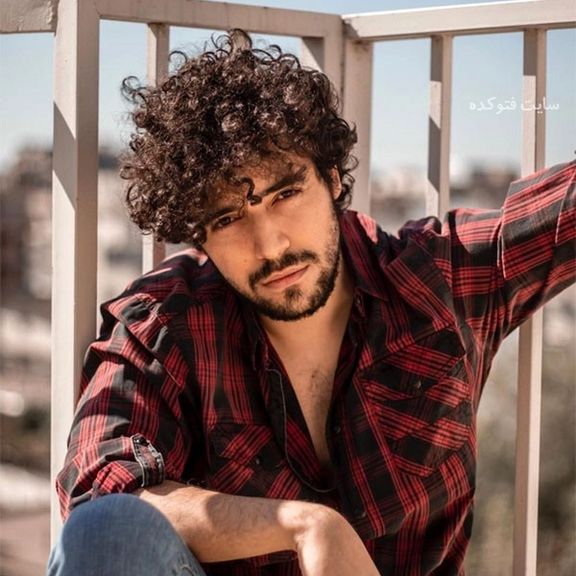
The Islamic Republic authorities are increasing pressure on Iranian celebrities as their support for the current uprising is growing on social media and during various events.
Ali Saeedi Shahroudi, the head of the Political and Ideological Office of the Commander in Chief of the Armed Forces and former representative of the Supreme Leader in the Revolutionary Guards, said on Monday that Iran should establish an organization to oversee the behavior of musicians, actors and sports stars similar to government-controlled outfits regulating professional groups.
The members of the country’s Engineering Organization or the Medical Council of the Islamic Republic cannot do whatever they want in fear of the consequences, he said, calling for establishing such a system for celebrities. Artists “committed to the Islamic Republic” should get to work and create such associations, Shahroudi said.
Since the beginning of the current wave of protests across Iran, sparked by the murder of 22-year-old Mahsa Amini in custody of hijab police, the Islamic Republic has confiscated passports of numerous celebrities and also detained several others over their support for the uprising.
Protests over the death of Mahsa Amini have gained more public support and demonstrations against the ruling theocratic regime and calls for a secular, democratic government have intensified. The unrest has been amplified by social media and, in some cases, celebrities with large online followings, such as footballers Ali Karimi and Ali Daei or singers such as Shervin Hajipour – whose song has become a manifesto for anti-regime demonstrators.
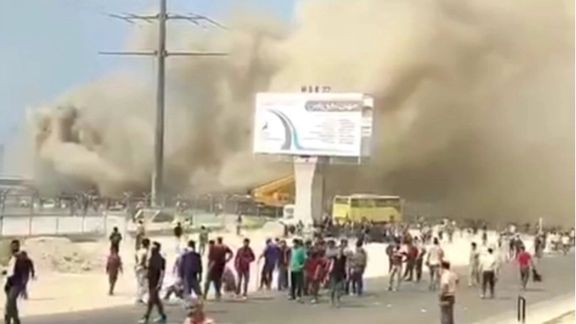
Some workers at Iran's Abadan Refinery have joined the petrochemical workers’ strike in Asalouyeh off the coasts of the Persian Gulf, which began Monday morning.
Social media reports say workers and staff of Phase 2 of state-owned Abadan Refinery walked out hours after reports of the strike at Asalouyeh Complex in Bushehr Province emerged. The government has disrupted access to mobile Internet in Khuzestan in the past few days but a video has emerged showing workers walking out Monday.
In other videos posted on social media contract workers at Asalouyeh are seen chanting “This year is the year of blood, Seyed Ali Khamenei is done! and “Down with the Dictator” in front of an administrative building. The narrator of the video says it is the beginning of the workday, 6:00 AM Monday, and that the workers have begun their “strike-campaign”.
The narrator of another video which shows smoke rising in the distance and workers gathering, says they have blocked the road to Asalouyeh Complex and gone on strike.In other videos workers are seen blocking the road with stones and rubble on a motorway where barrels of tar have been set on fire by workers.
Officials have accused protesters many of whom hail from other provinces and belong to various ethnic groups, of sabotage. “Long live Iran! Long live Lurs, Turks, Kurds, Arabs and Bakhtiari’s!” a worker says in one of the videos taken on the blocked road and stresses that workers are on strike in solidarity with the people of Iran.
Workers at Bushehr Petrochemical Company’s Site One at Asalouyeh Complex chanting “Don’t be afraid: We stand together!”.
Some social media reports claim workers of other companies in Asalouyeh have also joined the strike including Damavand Petrochemical Company and Kangan Petro Refining Company.
A statement by Council for Organizing Oil Contract-Workers’ Protests circulating on social media Monday said contract workers at Bushehr Petrochemical Company (Site One) and Hengam Petrochemical Company both of which operate at Asalouyeh Complex in Bushehr have begun their protests in solidarity with other protesters.
The statement urged all oil, gas, and petrochemical workers of every employment status (temporary, contract-based, permanent) as well as workers on oil rigs to start protesting and prepare for nation-wide strikes. “This is only the beginning of our path, and we will continue our protests every day in solidarity and in tandem with the people from all over the country.”
In some of the videos posted from Asalouyeh, however, workers clearly state that they are on strike.The council had warned last week that workers would not remain indifferent to the killing of protesters and would go on strike if it continued.
There are also reports that drivers of bitumen tankers employed by a private company have gone on strike and refused taking any loads for a fourth consecutive day from privately-owned Pasargad Oil Company serving Abadan Refinery.
In the capital Tehran, university students rallied to continue antigovernment protests. Images received show large demonstrations in Polytechnic and Amir Kabir universities.

A number of TV show hosts and presenters of the Iranian state television have resigned or been fired following their support for the ongoing nationwide protests.
As the Islamic Republic’s authorities are cracking down on people who are protesting against the government, they are also threatening or arresting celebrities who have voiced support for the protests.
Mojtaba Pourbakhsh, a presenter in a popular football show, was banned from the state TV because he expressed support for football star Ali Karimi, who has been very critical of the regime’s heavy-handed clampdown since the beginning of the current wave of the protests, triggered by the death of 22-year-old Mahsa Amini in hijab police custody.
Many celebrities have been summoned for questioning, or their passports have been confiscated, because of their social media posts demanding freedoms or calling on security forces to stop violence.
Amid the ongoing crisis in Iran ‘reformist’ commentator Abbas Abdi said in an interview on Sunday that what Iran's state-run television broadcasts are “sheer propaganda." Those who are looking for news in Iran will not turn to the state TV, Abdi argued.
Ironically, when hackers interrupted the state TV news program October 8, playing a short clip, most Iranians found out about it through social media reports or on foreign-based satellite TV rather than watching the actual program on the state TV.
Meanwhile, former Vice President Mostafa Hashemi Taba has argued in another interview that the state TV, also known as the Islamic Republic of Iran's Broadcasting organization (IRIB) excels in keeping Iranians uninformed about developments.
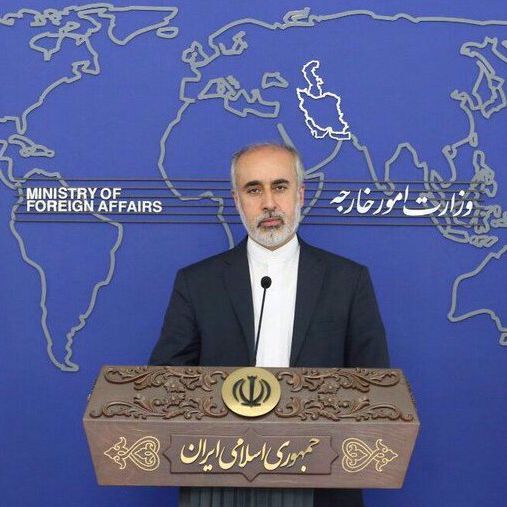
Tehran on Monday rejected any connection between nuclear talks with the West and protests in Iran, insisting that the internal situation does not concern others.
“European countries and America have linked the negotiating process to recent issues in Iran. The internal issue in Iran concerns the government and the people. We will not allow any country to meddle in Iran’s internal affairs,” foreign ministry spokesman Nasser Kanaani told reporters in Tehran.
As fierce antigovernment protests have entered their fourth week and close to 200 protesters are reported to have been killed by security forces, European countries, the United States and Canada have warned the Islamic Republic not to use force against its citizens.
Washington, Ottawa and the European Union have issued statements and some sanctions against those Iranian officials who have been identified as responsible for using repressive measures against protesters.
Kanaani stressed that as far as Tehran is concerned, the nuclear talks are not related to the protests and Iran is ready to continue the process.
Negotiations that the Biden Administration started in April 2021 to return to the Iran nuclear deal or JCPOA came to a halt before the current protests began in mid-September. The EU had presented a draft agreement in early August to Tehran and Washington based on 17 months of talks, but after several rounds of exchanges, Washington said that Tehran’s position was too far from bridging the gaps.
The onset of protests following the killing of Mahsa Amini after her arrest by the notorious ‘morality’ police, and a strong international reaction to the incident already signaled that chances for a nuclear deal further diminished.
While Amini’s killing became an important issue, Tehran’s violent reaction to protesters made the situation more complicated.
Any nuclear deal would mean lifting crucial sanctions that would hand tens of billions of dollars to the Islamic Republic, an untenable proposition in the current atmosphere.
Kanaani defended the actions of the clerical government, saying that authorities are defending “people’s security” and the United States and Europe are intervening in Iran’s internal affairs by advocating for human rights. He referred to a few incidents in Western capitals where Iranian protesters have tried to enter Islamic Republic embassies. He argued that the West has double standards, telling Iran not to use violence against protesters but allowing attacks on embassies.
Both in France and Britain police intervened on a few occasions not to allow any breach of embassy grounds by protesters. In September, French police used tear gasand attacked protesters near the Iranian embassy.
Meanwhile, the protests in Iran have gone much farther that the issue of Amini’s death in police custody. Numerous videos from demonstrations across the country show that protesters want an end to the Islamic Republic or clerical rule, demanding full social and political freedoms.
The 83-year-old ruler Ali Khamenei has become a particular target of protests, with people in the streets chanting, “Death to Khamenei” or “Death to the dictator.”
"These sanctions send a clear message to the Iranian authorities – we will hold you to account for your repression of women and girls and for the shocking violence you have inflicted on your own people," Foreign Secretary James Cleverly said in a statement on Monday.
He noted that the sanctions are imposed on morality police in its entirety, as well as both its chief, Mohammed Rostami Cheshmeh-Gachi, and the head of the Tehran Division, Ahmad Mirzaei.
The new measures mean that the designated individuals cannot travel to Britain and any of their assets held in Britain will be frozen.
The death of 22-year-old Mahsa Amini in hijab police custody has sparked protests against the theocratic regime across Iran and internationally, with Iranian demonstrators calling for the downfall of Supreme Leader Ali Khamenei and the Islamic Republic.
Last week, the British foreign ministry said it had summoned the Iranian charge d’affaires, Tehran’s most senior diplomat in Britain, over the crackdown on the protests. As fierce antigovernment demonstrations have entered their fourth week and close to 200 protesters are reported to have been killed by security forces, have issued statements and some sanctions against those Iranian officials who have been identified as responsible for using repressive measures.